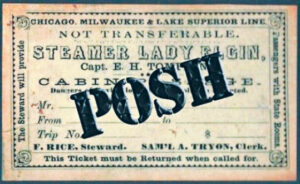What’s in a word? Simply this… a mélange of consonants and vowels, all put together in a pattern to form a word. Words come together to form a sentence. A senten—-oops here I go preachy, preachy. When it comes to anything to do with a language or literature, mainly English, the teacher and lecturer in me comes to the fore. Madam Editor comes to the rescue, “Darabsha, a family weekly, this. Don’t preach, don’t teach!” I ‘right-ho’ the suggestion and carry on.
English, as a language has always fascinated me. Since the last several days, I’ve been mulling over certain type of words, how they originated – some are anagrams, some aren’t, but their origins are worth knowing. Let me share my findings with you…
 ‘POSH’: Each letter stands for a word – ‘Port Out, Starboard Home’. This word originated during the heydays of the British Raj when airliners didn’t exist or were in their infancy. Huge Ocean liners crossed the oceans floating 5-star hotels. A voyage from England to India took over fifteen days. Wealthy travelers, aristocrats and rich businessmen had a gala time partying during their voyage. They paid more to get their cabins on the ‘P’ort side of the ship when travelling ‘O’ut to India. But when returning ‘H’ome to England, they preferred the ‘S’tarboard side of the liner to ensure the comfort of cabins facing the cool north side during their voyage. Their tickets were thus stamped ‘POSH’! Posh, the word, eventually came to denote rich, expensive, luxurious things and high-living.
‘POSH’: Each letter stands for a word – ‘Port Out, Starboard Home’. This word originated during the heydays of the British Raj when airliners didn’t exist or were in their infancy. Huge Ocean liners crossed the oceans floating 5-star hotels. A voyage from England to India took over fifteen days. Wealthy travelers, aristocrats and rich businessmen had a gala time partying during their voyage. They paid more to get their cabins on the ‘P’ort side of the ship when travelling ‘O’ut to India. But when returning ‘H’ome to England, they preferred the ‘S’tarboard side of the liner to ensure the comfort of cabins facing the cool north side during their voyage. Their tickets were thus stamped ‘POSH’! Posh, the word, eventually came to denote rich, expensive, luxurious things and high-living.
‘CABAL’: A cabal is a dedicated group, working or conspiring to gather for a certain purpose. In 17th century England, five of the very important members of the King Charles II parliament came together to form what came to be called the ‘Cabal Ministry’. They signed a treaty that brought together England and France in a potential war against the Netherlands. These five members of this ‘Cabal’ were Sir Thomas ‘C’lifford, Lord ‘A’rlington, the Duke of ‘B’uckingham, Lord ‘A’shley and Lord ‘L’auderdale. The first letters of their names formed the word ‘Cabal’!
 ‘TIP’: When we settle our bill in a restaurant, we pay a small amount to the waiter for the service given as a ‘tip’. Tip stands for ‘To Insure Promptness’. In the US, UK, and across Europe, one tips the cab driver and porter at the hotel as also the janitors who keep the loos squeaky clean. I am reminded of a story – I cannot vouch for its veracity but it goes thus: Henry Ford got off the cab and paid the fare tipping the cab-driver a dime. “Hey man!” exclaimed the cabbie. “Aren’t you Ford – who owns this building?’ Henry Ford replied in the affirmative. “Your son tips me $10/-, you only tip a dime?” Ford replied, “My son has a rich father. I don’t have one!” A tip in Hindi is referred to as ‘chai-pani’ (for a cuppa tea). Similarly in French, it is ‘pourboire’ (for a drink).
‘TIP’: When we settle our bill in a restaurant, we pay a small amount to the waiter for the service given as a ‘tip’. Tip stands for ‘To Insure Promptness’. In the US, UK, and across Europe, one tips the cab driver and porter at the hotel as also the janitors who keep the loos squeaky clean. I am reminded of a story – I cannot vouch for its veracity but it goes thus: Henry Ford got off the cab and paid the fare tipping the cab-driver a dime. “Hey man!” exclaimed the cabbie. “Aren’t you Ford – who owns this building?’ Henry Ford replied in the affirmative. “Your son tips me $10/-, you only tip a dime?” Ford replied, “My son has a rich father. I don’t have one!” A tip in Hindi is referred to as ‘chai-pani’ (for a cuppa tea). Similarly in French, it is ‘pourboire’ (for a drink).
DIAPERS: A diaper is a piece of cloth about the size of a napkin made of some form of absorbent material wrapped around the baby’s bottom to retain urine or poo. It is supposed to have originated from the town of Ypres in Belgium. The letter ‘d’ is French meaning ‘of or from’, making the proper noun ‘d’Ypres’ (meaning from Ypres), thereby sounding like diapers. This hypothesis may not be correct. The word diaper existed much before the town of Ypres came into existence. In England, this wrap is called a nappy, which is short for napkin.
DENIMS: The most widely used material for male and female leg-wear is the denim. It was first made in the 1850s and became a popular fabric with those who did hard manual work, like factory workers, laborers and workers laying railroad tracks. The word denim is derived from the French city of ‘Nimes’. The French preposition ‘de’ prefixed before ‘Nimes’ meaning of or from in French. Hence, we get the name ‘Denim’, of or from the city of Nimes!
JEANS: This most popular leg-wear of the 21st century, the jeans, originated as work-wear but quickly evolved into the most ‘à la mode’ fashion for male and female, the young and the elderly! Jeans were made of a twilled cotton fabric called the ‘Genoa fustian’, which went on to be dubbed by the labourers as ‘jeans’.
SNOB: The word ‘snob’ is said to have come from the custom of writing ‘s.nob’ (Sine nobilitat) Latin, meaning: ‘without nobility’, after the names of children of untitled parents applying for admission in certain English schools, in early 19th century. Another school of thought says snobs were younger sons of the aristocracy who had no title for themselves, after writing their name or affixing their signature would add ‘S. nob’ which was an abbreviated form for Son of Nobility. Today S.nob has become one word ‘snob’. It refers to one who is condescending of others, who looks down upon others; who blatantly shows off his wealth.
Here are a few words that we use quite often without realizing they are anagrams:
SMART: Specific, Measurable, Attainable, Realistic, Time-bound.
SCUBA: Self-Contained Underwater Breathing Apparatus.
SNAFU: the word is a synonym for confusion, foul-up, mess. It stands for ‘Situation Normal, All Fouled Up’.
Being Parsi, a blue-blooded Dhansakia Bawaji (notice, how I reverently use a capital D for Dhansak) no matter what I do, my thoughts stray back to food. I believe Shakespeare wrote, “If there is food can a Parsi be far behind.” Even on the subject of etymology, my thoughts dwelt upon food, one of the queenly concoction at the breakfast table and its origin, the Marmalade. Sometime in 16th century, Queen Mary of Scotland was travelling to France. En route she took ill and her French nurse served her a sweet, jelly-like concoction made from fruits and their peels. When the Scottish ladies-in-waiting, having scanty knowledge of French, asked what was the concoction given to the queen, the French nurse, equally scant in English, answered “Ma’me est malade, (the lady is sick). In the muddle, between English and French women, the word ‘marmalade’ was born! And today I cannot imagine my breakfast without a dollop of marmalade. The muddle can well be translated into Guajarati as ‘andhre-behru- kutiu’!
- Adarji Angrez! - 16 March2024
- V-Day – The D-Day! - 10 February2024
- Eighteen Going On Eighty! - 13 January2024
